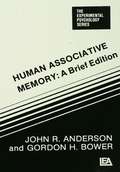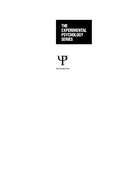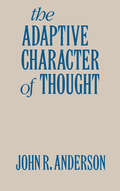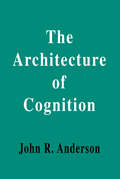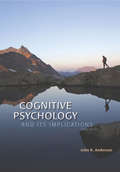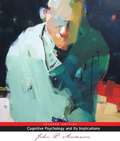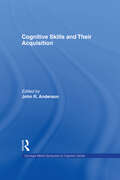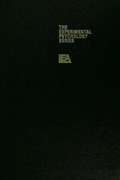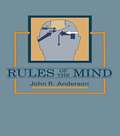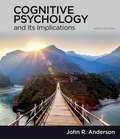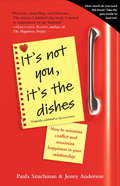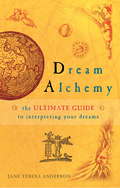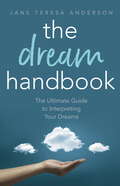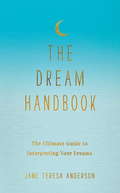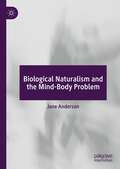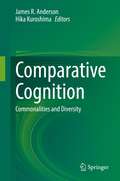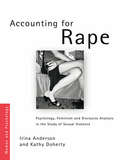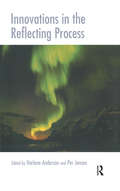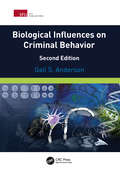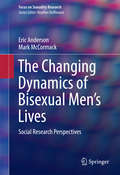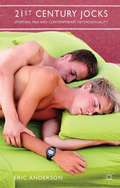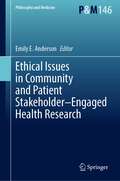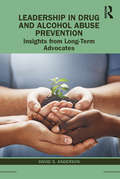- Table View
- List View
Human Associative Memory
by John R. Anderson G. H. BowerPublished in 1980, part of the Experimental Psychology series. This book proposes and tests a theory about human memory, about how a person encodes, retains, and retrieves information from memory. This edition contains two major parts. First is the historical analysis of associationism and its countertraditions. This still provides the framework that has been used to relate the current research to an important intellectual tradition. This is reproduced without comment from the original book; historical analyses do not need as rapid revision as theoretical analyses. The second part of the book reproduces the major components of the HAM theory.
Human Associative Memory
by John R. Anderson G. H. BowerFirst published in 1973. This book proposes and tests a theory about human memory, about how a person encodes, retains, and retrieves information from memory. The book is especially concerned with memory for sentential materials. We propose a theoretical framework which is adequate for describing comprehension of linguistic materials, for exhibiting the internal representation of propositional materials, for characterizing the interpretative processes which encode this information into memory and make use of it for remembering, for answering questions, recognizing instances of known categories, drawing inferences, and making deductions.
The Adaptive Character of Thought (Studies in Cognition)
by John R. AndersonThis important volume examines the phenomena of cognition from an adaptive perspective. Rather than adhering to the typical practice in cognitive psychology of trying to predict behavior from a model of cognitive mechanisms, this book develops a number of models that successfully predict behavior from the structure of the environment to which cognition is adapted. The methodology -- called rational analysis -- involves specifying the information-processing goals of the system, the structure of the environment, and the computational constraints on the system, allowing predictions about behavior to be made by determining what behavior would be optimal under these assumptions. The Adaptive Character of Thought applies this methodology in great detail to four cognitive phenomena: memory, categorization, causal inference, and problem solving.
The Architecture of Cognition (Cognitive Science Ser. #No. 5)
by John R. AndersonNow available in paper, The Architecture of Cognition is a classic work that remains relevant to theory and research in cognitive science. The new version of Anderson's theory of cognitive architecture -- Adaptive Control of Thought (ACT*) -- is a theory of the basic principles of operation built into the cognitive system and is the main focus of the book.
Cognitive Psychology and its Implications
by John R. AndersonJohn R. Anderson has been long been at the forefront of the study of cognition, with accomplishments that have informed the way cognitive psychology is investigated, applied, and taught. With this new edition of his classic textbook, Anderson again takes students to the forefront of the field, incorporating the latest theoretical breakthroughs, research findings, and technological advances, as well as marking the increasing role of neuroscience in the study of cognitive functions. As always, Anderson makes his discussions of higher mental processes concrete and accessible with fascinating examples and clear explanations of the underlying research.
Cognitive Psychology and Its Implications (7th edition)
by John R. AndersonAnderson offers systematic and accessible presentation of the theoretical foundations of higher mental processes, with each important idea made concrete by specific examples and experiments. Focusing on knowledge representation as the central issue of cognition research, the book emphasizes an information processing approach to the field, but offers thorough coverage of the cognitive neuroscience approach as well (extensively updated for this edition). Reflecting the evolution of current research, the new Seventh Edition looks closely at the dramatic contributions of cognitive neuroscience to the understanding of cognitive functions. New coverage, new color insert, new pedagogy, and other content and format innovations, make this definitive new edition the most student-friendly yet.
Cognitive Skills and Their Acquisition (Carnegie Mellon Symposia on Cognition Series)
by John R. AndersonFirst published in 1981. Routledge is an imprint of Taylor & Francis, an informa company.
Language, Memory, and Thought
by John R. AndersonPublished in 1976, Language, Memory, and thought is a valuable contribution to the field of Cognitive Psychology. This book presents a theory about human cognitive functioning, a set of experiments testing that theory, and a review of some of the literature relevant to the theory. The theory is embodied in a computer simulation model called ACT.
Rules of the Mind
by John R. AndersonRelated to the earlier well-known ACT production system theory, this book's basic goal is to present evidence for the psychological reality of a production system model of mind. Distinguished from the original theory in three ways, this volume uses the rational analyses of Anderson (1990) to improve upon that theory and extend its scope. It also relates the theory to a great deal of new data on the performance and acquisition of cognitive skills. The new theory -- ACT-R -- involves a neurally plausible implementation of a production system architecture. Rational analysis is used to structure and parameterize the system to yield optimal information processing. The theory is applicable to a wide variety of research disciplines, including memory, problem solving, and skill acquisition. Using intelligent tutors, much of the data is concerned with the acquisition of cognitive skills. The book provides analyses of data sets describing the extended course of the acquisition of mathematical and computer programming skills.
Cognitive Psychology and Its Implications
by John AndersonCognitive Psychology 9th edition takes students to the forefront of the field and introduces them to key discoveries of cognitive psychology. With accessible and clear explanations, Anderson shows students how mental processes are investigated and how we know what we know about the mind. Cognitive Psychology 9e introduces students to both the cutting edge findings of cognitive neuroscience and classic behavioral studies. Experimental data, sample stimuli, brain images, and research tasks woven throughout the text give students a real understanding of how research is conducted and the excitement of discovery. Fascinating examples and applications of cognitive theory further keep students engaged.
Border Crossing
by Jessica Lee AndersonManz, a troubled fifteen-year-old, ruminates over his Mexican father's death, his mother's drinking, and his stillborn stepbrother until the voices he hears in his head take over and he cannot tell reality from delusion.
It's Not You, It's the Dishes (originally published as Spousonomics)
by Jenny Anderson Paula SzuchmanYour marriage is fine, right? Sure, there are showdowns over who unloads more dishes, and some simmering discontent over who drives more car pools, cleans more dust bunnies, and keeps the social wheels of your existence greased. The sex is good, though you can't remember when you last had it. Come to think of it, you're plagued by a nagging sense that marriage used to be so much more fun. Marriage can be a mysterious, often irrational business. But the key, propose Paula Szuchman and Jenny Anderson in this incomparable and engaging book, is to think like an economist. We all have limited time, money, and energy, but we must allocate these resources efficiently. It's Not You, It's the Dishes is a clear-eyed, rational route to demystifying your disagreements and improving your relationship. Smart, funny, deeply researched, and refreshingly realistic, It's Not You, It's the Dishes cuts through the noise of emotions, egos, and tired relationship clichés to solve the age-old riddle of a happy, healthy marriage. Originally published as SpousonomicsFrom the Trade Paperback edition.
Dream Alchemy: The Ultimate Guide to Interpreting Your Dreams
by Jane Teresa AndersonA complete list of dreams and their meaning with magical dream alchemy practices to transform your life.Your dreams contain wisdom and insight about your waking life ? that's why they are so important. Using Dream Alchemy you can discover the meaning of your dreams and nightmares and then apply the dream alchemy practices to create positive life change. Included is information about how to:* Stop uncomfortable recurring dreams* Identify emotional obstacles and release them* Create more fulfilling relationships* Discover your talents and life purpose* Heal the past* Work with the emotions and feelings in your dreams* Transform fearful dreams into loving visions* Tap into your creative source* Identify your spiritual lessons and move forward* Use your dreams to strike personal and spiritual gold* Design your own dream alchemy practices.Jane Teresa Anderson is the author of several books on dreams and dreaming. She has presented Dream Talk Back for various ABC radio stations since 1992. Her Dream Network website www.dream.net.au hosts an active online community of dreamers from all over the world.
The Dream Handbook: The Ultimate Guide to Interpreting Your Dreams
by Jane Teresa AndersonYour dreams contain wisdom and insight about your waking life - that's why they are so important. Using THE DREAM HANDBOOK you can discover the meaning of your dreams and nightmares, and then apply the dream alchemy practices to create positive life change. Included is information about how to: - stop uncomfortable recurring dreams- identify emotional obstacles and release them - create more fulfilling relationships - discover your talents and life purpose - heal the past - work with the emotions and feelings in your dreams - transform fearful dreams into loving visions - tap into your creative source - identify your spiritual lessons and move forward - use your dreams to strike personal and spiritual gold - design your own dream alchemy practices.
The Dream Handbook: The Ultimate Guide to Interpreting Your Dreams
by Jane Teresa AndersonWe all dream - and quite often we wonder if our dreams mean anything. As it turns out . . . they do! Your dreams contain wisdom and insight about your waking life - that's why they are so important. Using The Dream Handbook you can discover the meaning of your dreams and nightmares, and then apply the dream alchemy practices to create positive life change.The Dream Handbook will help you:Stop uncomfortable recurring dreamsIdentify emotional obstacles and release themCreate more fulfilling relationshipsDiscover your talents and life purposeHeal the pastWork with the emotions and feelings in your dreamsTransform fearful dreams into loving visionsTap into your creative sourceIdentify your spiritual lessons and move forwardUse your dreams to strike personal and spiritual goldDesign your own dream alchemy practices
Biological Naturalism and the Mind-Body Problem
by Jane AndersonThis book offers a new theoretical framework within which to understand “the mind-body problem”. The crux of this problem is phenomenal experience, which Thomas Nagel famously described as “what it is like” to be a certain living creature. David Chalmers refers to the problem of “what-it-is-like” as “the hard problem” of consciousness and claims that this problem is so “hard” that investigators have either just ignored the issue completely, investigated a similar (but distinct) problem, or claimed that there is literally nothing to investigate – that phenomenal experience is illusory. This book contends that phenomenal experience is both very real and very important. Two specific “biological naturalist” views are considered in depth. One of these two views, in particular, seems to be free from problems; adopting something along the lines of this view might finally allow us to make sense of the mind-body problem.An essential read for anyone who believes that no satisfactory solution to “the mind-body problem” has yet been discovered.
Comparative Cognition: Commonalities and Diversity
by James R. Anderson Hika KuroshimaThis book presents an overview of selected topics in comparative cognition, which is the study of behaviour and mental activities in nonhuman animals. Human psychological capacities are often used as a heuristic by comparative cognitive scientists, whose tasks include designing valid procedures for studying species’ sensory, linguistic or manipulatory abilities that differ from those of humans. Nonetheless, researchers have developed many original ways to gain insights into how other species perceive the world, store and integrate information, and communicate. The contributors to this book have all been involved in such work, and will present some of the approaches that have led to clear advances in our understanding of cognitive processes in other species. The chapters integrate a review of past literature with recent work, covering a variety of subject species including birds, domestic dogs and cats, and nonhuman primates. All contributors have worked with or been otherwise influenced by Professor Kazuo Fujita, to whom the volume will be dedicated. Fujita’s openness to research on various topics and species is reflected in the diversity of the chapters presented.The book will be of interest to students and more experienced researchers in diverse fields including psychology, anthropology, biology and veterinary studies.
Accounting for Rape: Psychology, Feminism and Discourse Analysis in the Study of Sexual Violence (Women and Psychology)
by Irina Anderson Kathy DohertyAccounting for Rape presents an original perspective on the subject of rape, focusing on both female and male sexual violence. The authors investigate everyday beliefs about rape, to examine how blaming the victim and the normalization of rape are achieved by people in a discussion about sexual violence. They synthesize discursive psychology and a feminist standpoint to explore precisely how rape and rape victimhood are defined in ways that reflect the social, political and cultural conditions of society. By analysing conversational data, Anderson and Doherty suggest that the existing social psychological experimental research into rape and rape perception fails to analyse the subtlety and political significance of rape supportive reasoning. Accounting for Rape provides a critical interrogation of the dominant theories and methodologies, focusing on: How the gender and sexual orientation of alleged victims and perpetrators is crucial to social participants when making sense of a rape report and in apportioning blame and sympathy How arguments that are critical of alleged victims are built in ways that are 'face saving' for the participants in the conversations, and how victim-blaming arguments are presented as 'common sense'. The potential of applying this approach in both professional and academic contexts to promote attitude change. The book will be of great interest to those studying social and clinical psychology, cultural studies, sociology, women's studies and communication studies.
Innovations in the Reflecting Process: Innovations In The Reflecting Process - The Inspirations Of Tom Andersen (The Systemic Thinking and Practice Series)
by Harlene Anderson Per Jensen David Campbell Ros Draper'The passion to continually be on the move to seek new understanding is a characteristic of the field of family therapy and systemic thinking over the last forty years. Many professionals have moved around, more or less freely, in and out of this field. Some have made footprints that will last for a long time. One of these is Tom Andersen. From a position as professor in social psychiatry at the University of Tromso in northern Norway he has moved around the world participating with other professionals in their efforts to develop their work and seek wider horizons.' - Harlene Anderson and Per Jensen, from the Preface
Biological Influences on Criminal Behavior
by Gail AndersonBiological Influences on Criminal Behavior, Second Edition is fully updated to include recent research, studies, and publications examining the integration of the biological view with mainstream social, psychological, and environmental views in influences in criminality and criminal behavior. The first edition of the book was written with the belief, grounded in research, that something vital can be discovered when we assess all the factors related to the causes of crime, including biology. Since the first edition published, it has become broadly accepted that biology is certainly a factor in criminal behavior, albeit a singular piece to the puzzle. Increased collaborations between scientists and criminologists has led to a much stronger understanding of the intricacies of biology’s role in behavior. As well, more criminologists have biological backgrounds. As the science involved became more complex, so too did this text. This second edition considers the more recent and integrated research that is being conducted today to show the interaction between the environment and a person’s biology that lead to our behavior. It has even been shown that the environment acts on, and actually changes the functions, of some genes. The book begins with basic scientific principles and advances to introduce the reader to the more in-depth discussions of various biological influencers. Biological Influences on Criminal Behavior, Second Edition is written primarily for social science and law students who wish to understand this exciting area. The book offers a greater understanding of this rapidly growing field so that its lessons can help to inform policy, treatments, rehabilitation and the law.
Bodies In Treatment: The Unspoken Dimension (Relational Perspectives Book Series #Vol. 36)
by Frances Sommer AndersonBodies in Treatment is a challenging volume that brings into conceptual focus an "unspoken dimension" of clinical work - the body and nonverbal communication - that has long occupied the shadowy realm of tacit knowledge. By bringing visceral, sensory, and imagistic modes of emotional processing to the forefront, Editor Frances Sommer Anderson and the contributors to this original collection expand the domain of psychodynamic engagement. Working at the leading edge of psychoanalytic theory and practice, and in the forefront of the integrative psychotherapy movement, Anderson has created a collaborative project that stimulates interdisciplinary dialogue on the developmental neurobiology of attachment, the micro-processing of interchanges between the infant and caregiver, the neuroscience of emotional processing and trauma, body-focused talking treatments for trauma, and research in cognitive science. Enlightened by experiencing body-based treatments for thirty years, Anderson reflects on the powerful impact of these interventions, recounting attempts to integrate her somatically-informed discoveries into the "talking" frame. Reaching further, her contributors present richly informative accounts of how experiences in body-based modalities can be creatively integrated into a psychoanalytic framework of treatment. Readers are introduced to specialized modalities, such as craniosacral therapy and polarity therapy, as well as to the adjunctive use of yoga, the effectiveness of which can be grounded neurophysiologically. Somatic interventions are discussed in terms of the extent to which they can promote depth-psychological change outside the psychoanalytic consulting room as well as how they can enrich the relational process in psychodynamic treatment. The final sections of Bodies in Treatment explore the range of ways in which patients’ and therapists’ bodies engage, sustain, and contain the dynamics of treatment.
The Changing Dynamics of Bisexual Men's Lives
by Eric Anderson Mark MccormackThis important book provides unique new knowledge on thelived experience of openly bisexual men without medicalizing or pathologizingthem. Presenting research from sexology, sociology, and psychology, it featuresextensive findings on the sexual, social, romantic, and emotional behaviors ofthe 90 men interviewed in the U. S. and U. K. Issues and challenges are examinedin such areas as identity and self-concept, along with the burden of socialerasure and the paradox of stigma from both the gay and straight communities. However, the research reveals evidence of a recent cultural transition towardacceptance of bisexual identity and behavior, with younger bisexual menexperiencing better social lives and increased recognition of the legitimacy ofbisexuality. Among the topics covered: Examining the components of sexuality. Measuring and surveying bisexuality. Bisexual burden Demonstrating a generational cohort effect Expansion of gendered boundaries. Erosion of the one-time rule of homosexuality. Coming out in the 21st century. Bringing clarity and focus beyond the gender binary--andcompelling insights into why society and science have trouble shedding thatparadigm--The Changing Dynamics ofBisexual Men's Lives will interest sexuality scholars, sexologists, andsocial scientists studying the social aspects of sexuality.
21st Century Jocks: Sporting Men and Contemporary Heterosexuality
by Eric AndersonFrom macho huddles to gentle cuddles, the ways in which sportsmen relate as friends has radically changed. With homophobia stigmatized and gay teammates revered, today's jocks no longer fear being thought gay for behaviors that constrained men of the previous generation. In this eye-opening book, now in paperback, Professor Eric Anderson draws on hundreds of interviews with 15-22 year old straight and gay male athletes in both the United States and the United Kingdom to show how jocks haveredefined heterosexuality: kissing on the lips, dancing together, cuddling in bed, and proudly proclaiming their bromance with other men.
Ethical Issues in Community and Patient Stakeholder–Engaged Health Research (Philosophy and Medicine #146)
by Emily E. AndersonThis book provides in-depth analyses of a wide range of topics surrounding ethical issues in community and patient stakeholder–engaged health research, and highlights where consensus exists, is emerging, or remains elusive. Topics in this book cover the history of stakeholder engagement in health research; how codes of ethics and regulations have (or have not) addressed stakeholder engagement; how to promote equitable collaboration; the ethical perspectives of different stakeholders; and the unique challenges posed by stakeholder- engaged research to the protection of human research participants and the research ethics review process. The book includes discussion of unique issues that arise in stakeholder engagement relevant to different populations, settings, and research designs. This book is relevant for anyone with a role or interest in stakeholder-engaged research, including patient and community research partners; academic researchers; research ethics scholars and educators; and funders.
Leadership in Drug and Alcohol Abuse Prevention: Insights from Long-Term Advocates
by David S. AndersonLeadership in Drug and Alcohol Abuse Prevention blends the wisdom of numerous long-term professionals addressing drug and alcohol issues with helpful strategies and current science. Organized around the Pyramid of Success that emphasizes Competence, Confidence, and Commitment, this book offers practical and grounded approaches for better addressing substance abuse issues. Included are insights from 50 contributors, featuring professional perspectives from practitioners with decades of experience. While issues of substance abuse are not readily solved or cured, they can be better addressed – more effectively, more efficiently, and more appropriately. This timely resource offers a unique blend of science-based strategies and resourceful foundations for implementation. Designed for those working either directly or indirectly with problems associated with substance use disorders, this book will aid those in a wide variety of settings, whether in schools, communities, business, or government.
